- Home
- Henry James
The Daily Henry James Page 6
The Daily Henry James Read online
Page 6
June 11
The Princess Casamassima, 1886
“And indeed I have spoken just because the air is sweet, and the place ornamental, and the day a holiday, and your company exhilarating. All this has had the effect that an object has if you plunge it into a cup of water—the water overflows.”
June 12
Eugene Pickering, 1874
His mind was admirably active, and always, after an hour’s talk with him, I asked myself what experience could really do, that innocence hadn’t done to make it bright and fine.
June 13
The Beldonald Holbein, 1903
Of course, furthermore, “it took” in particular “our set,” with its positive child-terror of the banal, to be either so foolish or so wise; though indeed I’ve never quite known where our set begins and ends, and have had to content myself on this score with the indication once given me by a lady next whom I was placed at dinner: “Oh, it’s bounded on the north by Ibsen and on the south by Sargent.”
June 14
Roderick Hudson, 1875
There was a fresco of Guercino, to which Rowland, though he had seen it on his former visit to Rome, went dutifully to pay his respects. But Roderick, though he had never seen it, declared that it couldn’t be worth a fig, and that he didn’t care to look at ugly things. He remained stretched on his overcoat, which he had spread on the grass, while Rowland went off envying the intellectual comfort of genius which can arrive at serene conclusions without disagreeable processes.
June 15
The Bostonians, 1886
Miss Birdseye’s voice expressed only the cheerful weariness which had marked all this last period of her life, and which seemed to make it now as blissful as it was suitable that she should pass away. There was, to Ransom something almost august in the trustful renunciation of her countenance; something in it seemed to say that she had been ready long before, but as the time was not ripe she had waited, with her usual faith that all was for the best; only, at present, since the right conditions met, she couldn’t help feeling that it was quite a luxury, the greatest she had ever tasted.
June 16
The Wings of the Dove, 1903
“One could almost pity him—he has had such a good conscience.” “That’s exactly the inevitable ass.” “Yes, but it wasn’t—I could see from the only few things she first told me—that he meant her the least harm. He intended none whatever.”
“That’s always the ass at his worst.”
June 17
The Ambassadors, 1903
It must be added, however, that, thanks to his constant habit of shaking the bottle in which life handed him the wine of experience, he presently found the taste of the lees, rising, as usual, into his draught.
June 18
The Wings of the Dove, 1903
Their feeling was—or at any rate their modest general plea—that there was no place they would have liked to go to; there was only the sense of finding they liked, wherever they were, the place to which they had been brought.
June 19
George Sand, 1878
On one side an extraordinary familiarity with the things of the mind, the play of character, the psychological mystery, and a beautiful clearness and quietness, a beautiful instinct of justice in dealing with them; on the other side a startling absence of delicacy, of reticence, of the sense of certain spiritual sanctities and reserves.
June 20
The Wings of the Dove, 1903
Excitement, for each of them had naturally dropped, and—what they had left behind, or tried to, the great serious facts of life—were once more coming into sight as objects loom through smoke when smoke begins to clear.
June 21
Roderick Hudson, 1875
Rowland watched the shadows on Mount Holyoke, listened to the gurgle of the river, and sniffed the balsam of the pines. A gentle breeze had begun to tickle their summits, and brought the smell of the mown grass across from the elm-dotted river meadows. It seemed to him beautiful, and suddenly a strange feeling of prospective regret took possession of him. Something seemed to tell him that later, in a foreign land, he should remember it with longing and regret.
“It’s a wretched business,” he said, “this virtual quarrel of ours with our own country, this everlasting impatience to get out of it. Is one’s only safety then in flight? This is an American day, an American landscape, an American atmosphere. It certainly has its merits, and some time when I am shivering with ague in classic Italy I shall accuse myself of having slighted them.”
June 22
The Princess Casamassima, 1886
She was none the less plucky for being at bottom a shameless Philistine, ambitious of a front garden with rockwork; and she presented the plebeian character in none the less plastic a form.
June 23
The Bostonians, 1886
They wandered along the rocky waterside to a rocky shrub-covered point, which made a walk of just the right duration. Here all the homely languor of the region, the mild, fragrant Cape quality, the sweetness of white sands, quiet waters, low promontories where there were paths amid the barberries and tidal pools gleamed in the sunset —here all the spirit of a ripe summer afternoon seemed to hang in the air. There were wood-walks too; they sometimes followed bosky uplands, where accident had grouped the trees with odd effects of “style,” and where in grassy intervals and fragrant nooks of rest they came out upon sudden patches of Arcady.
June 24
The Portrait of a Lady, 1881
A dissatisfied mind, whatever else it lack, is rarely in want of reasons; they bloom as thick as butterflies in June.
June 25
Roderick Hudson, 1875
Gloriani with his head on one side, pulling his long moustache and looking keenly from half-closed eyes at the lighted marble, represented art with a worldly motive, skill unleavened by faith, the mere base maximum of cleverness.
June 26
The Ambassadors, 1903
“You’re being used for a thing you ain’t fit for. People don’t take a fine-tooth comb to groom a horse,”
“Am I a fine-tooth comb.” Strether laughed. “It’s something I never called myself!”
“It’s what you are, all the same. You ain’t so young as you were, but you’ve kept your teeth.”
June 27
What Maisie Knew, 1898
She was passively comical—a person whom people, to make talk lively, described to each other and imitated.
June 28
The Europeans, 1878
It gave her, nevertheless, a pleasure that had some of the charm of unwontedness to feel, with that admirable keenness with which she was capable of feeling things, that he had a disposition without any edges; that even his humorous. irony always softened toward the point.
June 29
The Awkward Age, 1899
A person who knew him well would, if present at the scene, have found occasion in it to be freshly aware that he was, in his quiet way, master of two distinct kinds of urbanity, the kind that added to distance and the kind that diminished it.
June 30
The Madonna of the Future, 1873
“He lived and moved altogether in. his own little province of art. A creature more unsullied by the world it is impossible to conceive, and I often thought it a flaw in his artistic character that he had not a harmless vice or two. It amused me greatly at times to think that he was of our shrewd Yankee race; but, after all, there could be no better token of his American origin than this high aesthetic fever. The very heat of his devotion was a sign of conversion; those born to European opportunity manage better to reconcile enthusiasm with comfort.”
July
We kept to the fields and copses and commons, and breathed the same sweet air as the nibbling donkeys and the browsing sheep, whose woolliness seemed to me, in those early days of my acquaintance with English objects, but a part of the general texture of the small dense landscape, which looked as if the h
arvest were gathered by the shears. Everything was full of expression—from the big, bandy-legged geese, whose whiteness was a “note,” amid all the tones of green, as they wandered beside a neat little oval pool, the foreground of a thatched and white-washed inn, with a grassy approach and a pictorial sign—from these humble wayside animals to the crest of high woods which let a gable or a pinnacle peep here and there, and looked, even at a distance, like trees of good company, conscious of an individual profile. I admired the hedge-rows, I plucked the faint-hued heather, and I was forever stopping to say how charming I thought the thread-like foot paths across the fields, which wandered in a diagonal of finer grain, from one smooth tile to another. We sat and smoked upon stiles, broaching paradoxes in the decent English air, we took short cuts across a park or two, where the bracken was deep, and my companion nodded to the old woman at the gate. We skirted rank covers, which rustled here and there as we passed, and we stretched ourselves at last on a heathery hillside where, if the sun was not too hot, neither was the earth too cold, and where the country lay beneath us in a rich blue mist.
The Author of Beltraffio, 1885
July 1
The Europeans, 1878
“You strike me as very capable of enjoying, if the chance were given you, and yet at the same time as incapable of wrong-doing.”
“What ought one to do? To give parties, to go to the theatre, to read novels, to keep late hours?”
“I don’t think it’s what one does or doesn’t do that promotes enjoyment,” her companion answered. “It is the general way of looking at life.”
“They look at it as a discipline—that is what they do here. I have often been told that.”
“Well, that’s very good. But there is another way—to look at it as an opportunity.”
July 2
The Golden Bowl, 1904
He knew his ante natal history, knew it in every detail, and it was a thing to keep causes well before him. What was his frank judgment of so much of its ugliness, he asked himself, but a part of the cultivation of humility? If what had come to him wouldn’t do he must make something different.
July 3
The Pension Beaurepas, 1879
“Some things—some differences—are felt, not learned. To you liberty is not natural; you are like a person who has bought a repeater and in his satisfaction, is constantly making it sound. To a real American girl her liberty is a very vulgarly ticking old clock.”
July 4
Charles Baudelaire, 1878
He knew evil not by experience, not as something within himself, but by contemplation and curiosity, as something outside of himself, by which his own intellectual agility was not in the least discomposed, rather, indeed (as we say his fancy was of a dusky cast) agreeably flattered and stimulated. In the former case, Baudelaire, with his other gifts, might have been a great poet. But, as it is, evil for him begins outside and not inside, and consists primarily of a great deal of lurid landscape and unclean furniture. This is an almost ludicrously puerile view of the matter—a good way to embrace Baudelaire at a glance is to say that he was, in his treatment of evil, exactly what Hawthorne was not—Hawthorne, who felt the thing at its source, deep in the human consciousness. Baudelaire’s infinitely slighter volume of genius apart, he was a sort of Hawthorne reversed.
[Nathaniel Hawthorne born on this day in 1804]
July 5
The Golden Bowl 1904
For it may immediately be mentioned that this amiable man bethought himself of his personal advantage, in general, only when it might appear to him that other advantages, those of other persons, had successfully put in their claim. It may be mentioned also that he always figured other persons—such was the law of his nature—as a numerous array.
July 6
An International Episode, 1879
“I must say I think that when one goes to a foreign country, one ought to enjoy the differences. Of course there are differences; otherwise what did one come abroad for?”
July 7
The Portrait of a Lady, 1881
In the long afternoons, of which the length was but the measure of her gratified eagerness, they took a boat on the river, the dear little river, as Isabel called it, where the opposite shore seemed still a part of the foreground of the landscape; or drove over the country in a phaeton—a low, capacious, thick-wheeled phaeton. Isabel enjoyed it largely, and, handling the reins in a manner which approved itself to the groom as “knowing,” was never weary of driving her uncle’s capital horses through winding lawns and byways full of the rural incidents she had confidently expected to find; past cottages thatched and timbered, past ale-houses latticed and sanded, past patches of ancient common and glimpses of empty parks, between hedgerows made thick by midsummer.
July 8
The Art of Fiction, 1884
To what degree a purpose in a work of art is a source of corruption I shall not attempt to enquire; the one that seems to me least dangerous is the purpose of making a perfect work.
July 9
What Maisie Knew, 1898
She knew governesses were poor; Miss Overmore was unmentionably and Mrs. Wix familiarly so. Neither this, however, nor the old brown frock, nor the diadem, nor the button, made a difference for Maisie in the charm put forth through everything, the charm of Mrs. Wix’s conveying that somehow, in her ugliness and her poverty, she was peculiarly and soothingly safe, safer than anyone in the world—than papa, than mamma, than the lady with the arched eyebrows; safer even, though much less beautiful, than Miss Overmore, on whose loveliness, as she supposed it, the little girl was faintly conscious that one couldn’t rest with quite the same tucked-in and kissed for good-night feeling. Mrs. Wix was as safe as Clara Matilda, who was in heaven, and yet, embarrassingly, also in Kensal Green, where they had been together to see her little huddled grave.
July 10
Ivan Turgénieff, 1884
Like all men of a large pattern, he was composed of many different pieces; and what was always striking in him was the mixture of simplicity with the fruit of the most various observation.
July 11
The Liar, 1889
Women have no faculty of imagination with regard to a man’s work beyond a vague idea that it doesn’t matter.
July 12
The Europeans, 1878
One could trust him, at any rate, round all the corners of the world; and, withal, he was not absolutely simple, which would have been excess; he was only relatively simple.
July 13
The Bostonians, 1886
Olive had seen how Verena was moved by Miss Birdseye’s death; how at the sight of that unique woman’s majestically simple withdrawal from a scene in which she had held every vulgar aspiration, every worldly standard and lure, so cheap, the girl had been touched again with the spirit of their most confidant hours, had flamed up with the faith that no narrow personal joy could compare in sweetness with the idea of doing something for those who had always suffered and who waited still.
July 14
The Great Good Place, 1900
‘‘There it is. The thing’s so perfect that it’s open to as many interpretations as any other great work—a poem of Goethe, a dialogue of Plato, a symphony of Beethoven. “It simply stands quiet, you mean,” Sam said, “and lets us call it names?” “Yes, but all such loving ones.”
July 15
Roderick Hudson, 1875
“But what you say,” she said at last, “means change!”
“Change for the better!” cried Rowland.
“How can one tell? As one stands one knows the worst. It seems to me very frightful to develop.”
“One is in for it in one way or another, and one might as well do it with a good grace as with a bad! Since one can’t escape life it is better to take it by the hand.”
July 16
The Wings of the Dove, 1903
It had never been pride, Maud Manningham, had hinted, that kept her from crying when other things mad
e for it; it had only been that these same things, at such times, made still more for business, arrangements, correspondence, the ringing of bells, the marshalling of servants, the taking of decisions. “I might be crying now,” she said, “if I weren’t writing letters.”

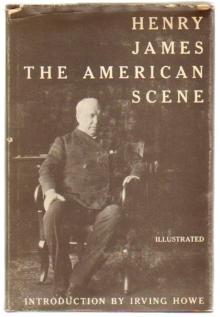 The American
The American The Wings of the Dove, Volume 1 of 2
The Wings of the Dove, Volume 1 of 2 Frost at Midnight
Frost at Midnight Morning Frost
Morning Frost The Portrait of a Lady — Volume 1
The Portrait of a Lady — Volume 1 Fatal Frost
Fatal Frost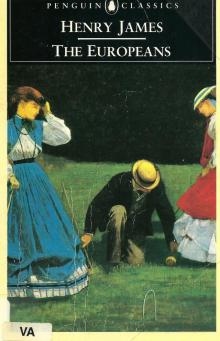 The Europeans
The Europeans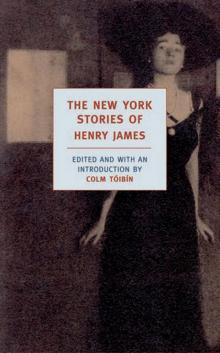 The New York Stories of Henry James
The New York Stories of Henry James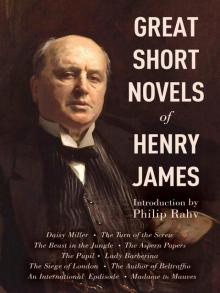 Great Short Novels of Henry James
Great Short Novels of Henry James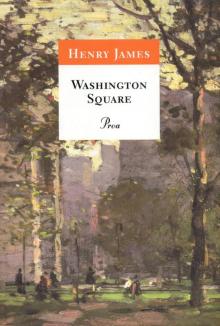 Washington Square
Washington Square The Portrait of a Lady — Volume 2
The Portrait of a Lady — Volume 2 The Ambassadors
The Ambassadors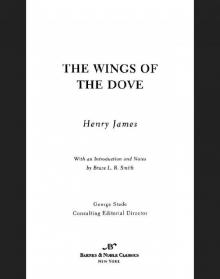 The Wings of the Dove
The Wings of the Dove The Princess Casamassima (Classics)
The Princess Casamassima (Classics) The Coxon Fund
The Coxon Fund First Frost
First Frost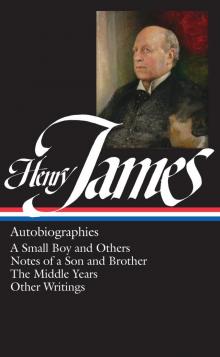 Henry James
Henry James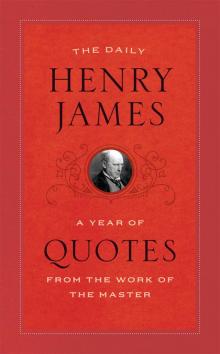 The Daily Henry James
The Daily Henry James Travels With Henry James
Travels With Henry James The Reverberator: A Novel
The Reverberator: A Novel What Maisie Knew (Henry James Collection)
What Maisie Knew (Henry James Collection)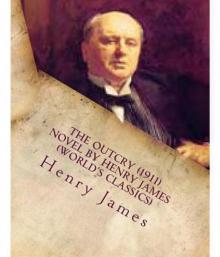 The Outcry
The Outcry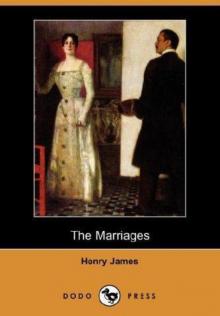 The Marriages
The Marriages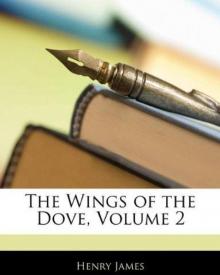 The Wings of the Dove, Volume 2
The Wings of the Dove, Volume 2 The Bostonians, Vol. I
The Bostonians, Vol. I The Outcry: -1911
The Outcry: -1911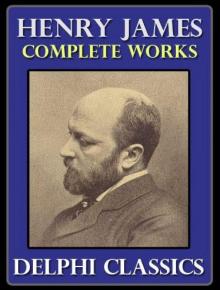 The Complete Works of Henry James
The Complete Works of Henry James Letters from the Palazzo Barbaro
Letters from the Palazzo Barbaro The Pupil
The Pupil The Bostonians, Vol. II
The Bostonians, Vol. II Pandora
Pandora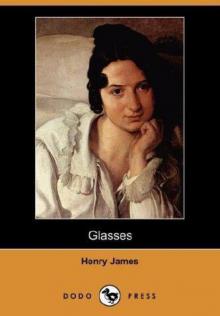 Glasses
Glasses The Princess Casamassima
The Princess Casamassima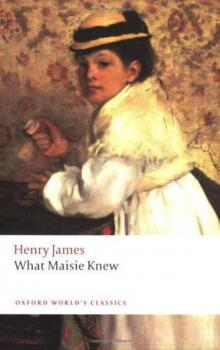 What Maisie Knew
What Maisie Knew The Reverberator
The Reverberator The Golden Bowl - Complete
The Golden Bowl - Complete Confidence
Confidence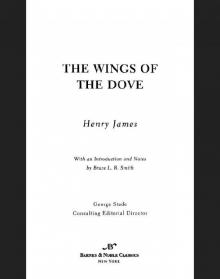 Wings of the Dove (Barnes & Noble Classics Series)
Wings of the Dove (Barnes & Noble Classics Series) The Spoils of Poynton
The Spoils of Poynton